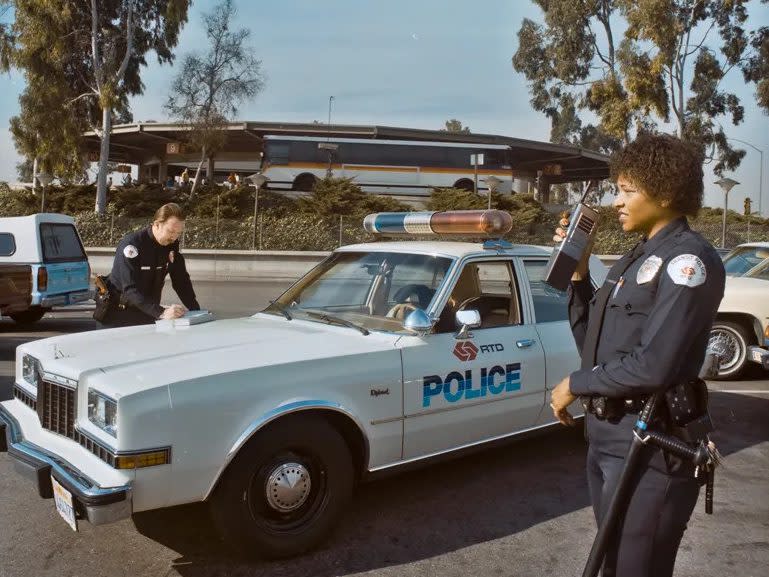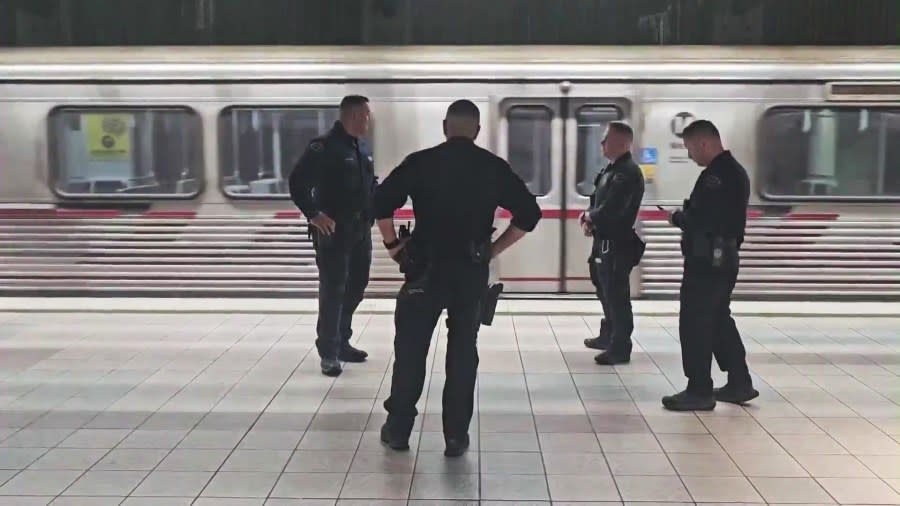LA Metro moves forward with plan to establish own police force
More than a year after the LA Metro board approved a plan to explore creating its own transit police force, board members moved forward with a plan to make it a reality.
During the LA Metro’s regularly scheduled board meeting Thursday, the board was presented with possible plans related to establishing a new in-house public safety department.
After hours of public comment and statements from the leaders of the three law enforcement agencies currently contracted to provide public safety services on LA Metro trains and buses, the board decided it was best to begin the long process of building a new police force from the ground up and ending or modifying its existing contracts with regional law enforcement partners.
The vote passed unanimously with 10 affirmatives; several members of the Metro board were absent.
LA Metro will now move forward with a five-year phased transition to establish a “Transit Community Public Safety Department.”
The next steps for establishing the TCPSD include creating a “transition team” comprised of experts in various public safety matters, including policing, mental health social services and human resources.
LA Metro will also have to work with CalPERS, which administers retirement benefits for state employees, and begin the process of recruiting officers to staff the new police force.
L.A. to Bay Area bullet train gets full environmental approval
The decision to build its own police force is a historic and ambitious one, but is not without precedent in either Los Angeles or other major metropolitan areas.
The move aligns L.A. with other regions that employ their own transit police, including the Bay Area, Massachusetts and Washington, D.C.
LA Metro did have its own version of transit police between 1978 and 1997, which was created due to a spike in violent crime across the transit system, particularly against bus operators.
Sound familiar?
The Southern California Rapid Transit District operated a police force with more than 500 officers at its peak, making it the 10th largest law enforcement agency in California and the largest transit police force in the nation.
The agency was eventually merged into the Los Angeles Police Department and Los Angeles County Sheriff’s Department in a cost-cutting — and political — move, according to India Mandelkern, author for Metro’s online blog The Source.
Those law enforcement agencies, plus the Long Beach Police Department, continue to police the system today, although their effectiveness in comparison to their multimillion-dollar contracts has been questioned.
A 2023 audit from the Office of the Inspector General found that many of the law enforcement officers tasked with patrolling transit stations, trains and buses spent the vast majority of their time away from those areas and instead spent most of their time in their vehicles. That audit also found that more than half of transit-related 911 calls received responses from officers not assigned to the Metro system.
Lack of law enforcement presence criticized by Metro leaders
LAPD interim chief Dominic Choi, Los Angeles County Sheriff Robert Luna and LBPD chief Wally Hebeish attended Thursday’s meeting to answer questions from board members and defend the performance of law enforcement officers assigned to Metro duty.
“We can’t be everywhere,” Luna said, referencing the size of Metro’s service area. “We do the best that we can to keep people safe and we have pretty darn good response times.”
Sheriff Luna continued by saying that he believes building a new law enforcement agency from scratch is risky with major sporting events, including the 2026 FIFA World Cup, the Super Bowl in 2027, and the 2028 Olympics and Paralympics, happening within the upcoming years.
“This is not the time to experiment with new projects,” he said. “Public safety is too important for that. “
While Metro officials have been critical of the performance of contracted law enforcement throughout the transit system, those large law enforcement contracts have continued to be extended and renewed.
That’s led to many activists calling for the resurrection of a dedicated transit police force in hopes that it will allow LA Metro to better manage safety and increase quality of life for riders and drivers.
In 2024, much of the challenges from previous years that led to the creation of an in-house police force — violent crime against passengers and transit operators — remain. But new issues plaguing LA Metro include the rise of deadly narcotics like fentanyl and a significantly larger homeless population, Mandelkern writes.
Thursday’s decision to give it another go is the first step in what is likely to be a lengthy and possibly contentious process.
Copyright 2024 Nexstar Media, Inc. All rights reserved. This material may not be published, broadcast, rewritten, or redistributed.
For the latest news, weather, sports, and streaming video, head to KTLA.



